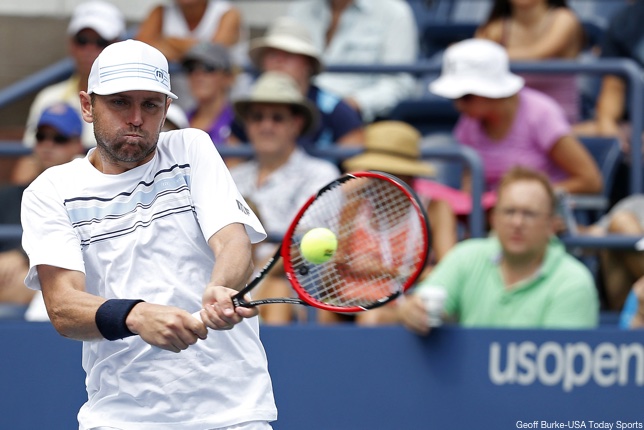Mardy Fish cannot put himself in a time machine and go back to 2012 when he was gearing up for his fourth-round U.S. Open match against then-world No. 1 Roger Federer. He cannot go back and stop his anxiety from overtaking him.
Fish is at peace with that. Without that experience, he probably would not have won his first round-match Monday.
Three years ago, Fish was in his prime. He was 30, and he had advanced to the third round of the U.S. Open in each of the three previous years. He had reached his highest world ranking at No. 7 in 2011.
Then his match against Federer never happened. Fish withdrew due to "health reasons." Behind closed doors, he was suffering from anxiety disorder.
"All of a sudden, it wasn't quite good enough to make the fourth round of a Grand Slam," he says.
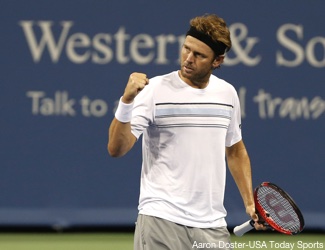
The first sign that something was wrong came after a match in early 2012. Fish was rushed to the hospital with severe cardiac arrhythmia. He underwent a procedure to correct faulty electrical connections in his heart. By the U.S. Open, Fish was dealing with panic attacks every 15-30 minutes. To advance the match against Federer, Fish grinded past Gilles Simon in four sets, late into the Flushing night.
"I was feeling terrible at that time and not really aware of what was necessarily going on," Fish says. "I hadn't sought help at that point. I knew something was weird and off.
"Next thing I know, I was off the court and in the doctor's office with an EKG unit stuck to me."
Fish had trouble getting on planes and going through other actions of daily life. Fish didn't leave his house for three months. His tennis game dropped off the map. He did not play again in 2012, and in 2013, Fish played in just six tournaments (no Grand Slams) and none in 2014.
Fish had an ideal life. He was a professional athlete married to model and lawyer Stacey Gardner (Deal or No Deal) with famous friends such as James Blake and Andy Roddick. But his anxiety prompted him to consider.
"I started playing a different sport (golf)," he says. "There is a reason I didn't retire, because I figured deep down, I wanted to go out on my own terms. A huge part of it is just coming back here, enjoying the tournament one last time and sort of conquering what happened."
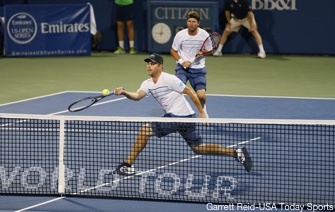
On Monday, Fish returned to the U.S. Open, his first Grand Slam since that walkover loss to Federer. A protected ranking allows Fish to participate in a limited number of ATP World Tour events. In three summer stops, Fish arrived in Queens 1-3 on the season. He announced he will officially retire after the U.S. Open.
The American had some U.S. Open magic left in him at the Grandstand. Fish, No. 581 in the world, beat No. 106 Marco Cecchinato of Italy, 6-7, 6-3, 6-1, 6-3.
"It felt great just apart from if it would have been straight sets instead of four sets," Fish says with a chuckle.
Fish says he is still not 100 percent in his day-to-day activities. Although he made it back to the court, his anxiety is still present.
"I spent a lot of time on the court today telling myself that I'm going to be OK," Fish says. "Everything's going to be OK. You're going to be fine. It's a lot of of internal talk. That comes from you just learning from every experience and episode that I have had."

Fish broke Cecchinato on his opponent's first service game, but Cecchinato fought back to force and win a tiebreaker. This is not exactly an ideal scenario for an athlete with anxiety. Fish was also dealing with the New York heat, which increased his stress.
"I figure if I lost this set, I was going to be in for a really long day that maybe I can't push myself through," Fish says of being broken at 5-5 in the first set. "And I got through it. I knew that I was playing fine. It was just a matter of getting going. Was my body going to hold up? Was I going to hold up?"
Fish had not played a three-hour match or four-set match since Simon. "I haven't hit tennis balls for three hours in practice at all. Naturally, you look at the clock and you're a bit worried," he says. Monday's match lasted two hours and 52 minutes.
"Three years ago, that would have been tough. I have come a long way and worked really hard with it. I don't take it for granted."
Three years ago, Fish was a legitimate contender on the ATP Tour. Now he is more of a mentor than a threat to his fellow players. Fish says he wants to be the role model he could not find when dealing with his anxiety.
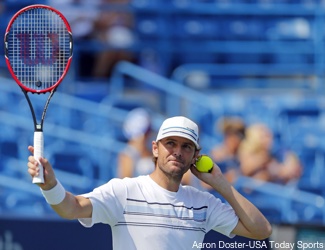
"He's been out of competitive tennis, it seems, like much longer than it actually has been," says John Isner, the current highest-ranked American player at No. 13. "He's dealt with a lot of health issues, a lot of scary health issues, which he's been very open about, which I think has helped him. I think he showed in Cincinnati he's got a lot of game left (Fish won his other match of the season, 6-2, 6-2 over current world No. 22 Viktor Troicki). If he wanted to play after this U.S. Open, he definitely could."
Fish used to practice with a heart rate monitor to track how fast he could get his heart rate down. No longer having the pressure of being a top-ranked player allows Fish to enjoy the ride in this final U.S. Open -- and spread his story.
"Anxiety disorder is where your mind takes over and usually goes into the future and sort of predicts what you think is going to happen, and usually, it's bad stuff," Fish says. "If it helps me to talk about it, maybe it helps other people to talk about it."
Venus Williams has dealt with her own off-court health issues, such as Sjögren's syndrome, an autoimmune disease. In 2011, Williams made a sudden withdrawal in the second round at the U.S. Open.
"The important thing is not to complain about it," Williams says of Fish's disorder. "He's taking it like a man. It's really bad luck what's happened to him, but he's held his head high. He's made something of his opportunities here."
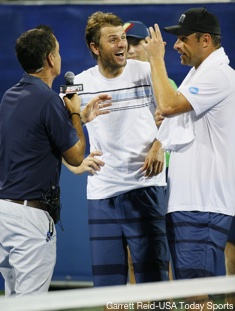
Critics may say it is impossible to treat a mental disease such as anxiety "like a man." These are just extra demons for Fish to beat.
"There are tens of millions of Americans that deal with it on a daily basis," Fish says. "There's a ton of guys in the locker room I'm sure that have trouble with it from whatever level it is. I have spoken to some male and female players about it, privately. Maybe they are just not comfortable right here with cameras on them talking about it."
With all of the fame and fortunate that come with every victory in sports, it is rare to see an athlete focus on personal goals unrelated to winning and losing. He could have rolled over in 2013 or 2014 and called it quits. He had an accomplished career by age 30 and no shame. Instead, he pushed through for one last summer hurrah.
"I want to sort of take in everything and enjoy all aspects of this tournament because it is so great, but sometimes, it's hard," he says.
On Monday, he was on top of his sport, not on paper, but on his conscience.
At the end of the day, how Mardy Fish feels is all Mardy Fish will care about.
Fish will meet No. 18 seed Feliciano Lopez of Spain in the second round.
Hell yeah Fishy! @MardyFish
— andyroddick (@andyroddick) August 31, 2015
Congratulations #Vikings fan and MN native @MardyFish on his first round win in his last @usopen!
— Minnesota Vikings (@Vikings) August 31, 2015
Mardy Fish is moving on as he defeats Cecchinato 7-6, 3-6, 6-1, 6-3. HIGH FIVE @MardyFish! #usopen pic.twitter.com/qWL10rhkpH
— US Open Tennis (@usopen) August 31, 2015
You're a treasured part of the game and American tennis. So glad you came back to play here at the #USOpen https://t.co/GqtQTZXzPu
— Hannah Storm (@HannahStormESPN) August 31, 2015
Looking for someone to root for this week. Here's a place to start. Good luck Mardy. https://t.co/dpYRMw2W38
— MikeTirico (@miketirico) August 30, 2015
Honor @MardyFish's 1st round US Open victory by learning about Generalized Anxiety Disorder. Affects millions & its debilitating
— Darren Rovell (@darrenrovell) August 31, 2015
-- Follow Jeffrey Eisenband on Twitter @JeffEisenband.

